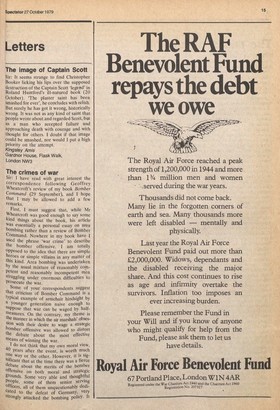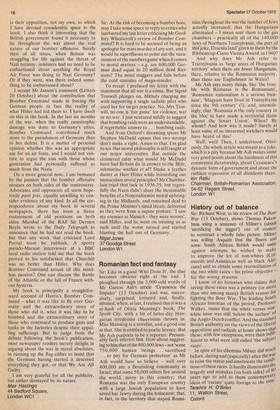Letters
The image of Captain Scott
Sir: It seems strange to find Christopher Booker licking his lips over the supposed destruction of the Captain Scott 'legend' in Roland Huntford's ill-natured book (20 October). 'The plaster saint has been smashed for ever', he concludes with relish. But surely he has got it wrong, historically Wrong. It was not as any kind of saint that people wrote about and regarded Scott, but as a man who accepted failure and approaching death with courage and with thought for others. I doubt if that image could be smashed, nor would I put a high priority on the attempt.
Kingsley Amis Gardnor House, Flask Walk, London NW3
The crimes of war
Sir: I have read with great interest the correspondence following Geoffrey Wheatcroft's review of my book Bomber Command (29 September), and I hope that I may be allowed to add a few remarks.
First, I must suggest that, while Mr Wheatcroft was good enough to say some kind things about the book, his article was essentially a personal essay on area bombing rather than a review of Bomber Command. Nowhere in my book have I used the phrase 'war crime' to describe the bomber offensive. I am totally Opposed to the idea that there are simple heroes or simple villains in any matter of this kind. Area bombing was undertaken by the usual mixture of reasonably competent and reasonably incompetent men stiuggling under enormous difficulties to prosecute the war.
Some of your correspondents suggest that criticism of Bomber Command is a typical example of armchair hindsight by a younger generation naive enough to suPpose that war can be waged by halfmeasures. On the contrary, my theme is the manner in which the air marshals' obsession with their desire to wage a strategic bomber offensive was allowed to distort the debate about the most effective means of winning the war. I do not think that my own moral view, 40 years after the event, is worth much one Way or the other. However, it is significant that at the time there was a fierce debate about the merits of the bomber Offensive on both moral and strategic grounds. Some very able and thoughtful People, some of them senior serving Officers, all of them unquestionably dedicated to the defeat of GermanY, very strongly attacked the bombing policy. It is their opposition, not my own, to which I have devoted considerable space in the book. I also think it interesting that the British government found it necessary to lie throughout the war about the real nature of our bomber offensive. Surely then of all times, when Britain was struggling for life against the threat of Nazi tyranny, ministers had no need to be embarrassed about anything the Royal Air Force was doing to Nazi Germany? Or if they were, was there indeed something to be embarrassed about?
I accept Mr Janson's comment (Letters 20 October) about the contribution that Bomber Command made in forcing the German people to face the reality of what Hitler had led them to. I have dwelt on this in the book. In the last six months of the war, when the really catastrophic damage was done to Germany's cities, Bomber Command contributed much more to the punishment of Germany than to her defeat. It is a matter of personal opinion whether this was an appropriate use for an air force, and I would not venture to argue the toss with those whose generation had personally suffered so much from the Nazis.
On a more general note, I am bemused by the passion that the bomber offensive arouses on both sides of the controversy. Advocates and opponents all seem hopelessly parti pris, equally unwilling to consider evidence of any kind. In all the correspondence about my book in several newspapers, there has been a fierce restatement of old positions on both sides, Marshal of the RAF Sir Dermot Boyle wrote to the Daily Telegraph to announce that he had not read the book, but that any work that criticised Lord Portal must be rubbish, A spotty pseudo-Marxist interviewer at a BBC local radio station told me that the book proved to his satisfaction that Churchill was no better than Hitler. Why does Bomber Command arouse all this mindless passion? One can discuss the Battle of the Atlantic or the fall of France without hysteria.
My book is principally a straightforward account of Harris's Bomber Command — what it was like to fly over Germany and the extraordinary story of those who did it, what it was like to be bombed and the extraordinary story of those who continued to produce guns and tanks in the factories despite their appalling sufferings. But to judge from the debate following the book's publication, most newspaper readers merely delight in arguing about the war in moral absolutes, in running up the flag either to insist that the Germans having started it deserved everything they got, or that We Are All Guilty.
I am very grateful for all the publicity, but rather dismayed by its nature.
Max Hastings 44 Bedford Square, London WC1 Sir: At the risk of becoming a bomber bore, may I take some space to reply to critics who lambasted my last letter criticising Mr Geoffrey Wheatcroft's review of Bomber Command? It is hard to be accused of being an apologist for mass murder of any sort, and it would be superfluous to point out the vacuousness of the numbers game when it comes to moral matters — e.g. are 600,000 German dead equal to 20 million dead Russians? The mind staggers and fails before the cold statistics of mega-murder.
To recap: I prefaced my letter with the statement that all war is a crime. But Sigrid Tosswill plunges on, blithely charging me with supporting a single sadistic pilot who used her for target practice. No, Mrs Tosswill, no one is 'fair game' for violence, war or no war. I just ventured mildly to suggest that bombing raids were an understandable, if regrettable answer to. . bombing raids.
And from Oxford's dreaming spires Mr Stephen McDadd opines that two wrongs don't make a right. Amen to that. I'm glad to see that moral philosophy is still taught at our major universities, But outside the cloistered calm what would Mr McDadd have had Britain do in answer to the Blitz, submarine warfare et al? Shake a feather duster at Herr Hitler while burnishing our immaculate moral principles? Mr Chamberlain tried that tack in 1936-39, but regretfully the Nazis didn't share the inestimable benefits of a Nonconformist moral upbringing in the Midlands, and remained deaf to the Prime Minister's timid bleats, delivered as they were from a supine posture. 'I saw my enemies at Munich they were worms', said Hitler, and he went on treating us as such until the worm turned and started blasting the hell out of Germany.
Nigel Jones 37 Goodge Street London W1
Romanian fact and fantasy
Sir: Like in a good 'Who Done It', the clue becomes obvious right at the end. I ploughed through the 3,000-odd words of Mr Garton Ash's article 'Ceausescu the Impaler' (13 October) and was, successively, surprised, irritated and, finally, amused, when, at last, I realised that it was a re-hash of Olivia Manning's book, The Spoilt City, with a bit of latter-day Hungarian irredentist chauvinism thrown in. Miss Manning is a novelist, and a good one at that. She is entitled to poetic licence. But Mr Ash purports to be a reporter. Presumably facts interest him. How about suggesting to him that of the 800,000 Jews— not 'some 750,000 human beings . sacrificed . to pay for German protection' as Mr Ash would have us believe — well over 400,000 are a flourishing community in Israel; that some 50,000 others live around the world, many in this country; that Romania was the only European country with a large Jewish population to have saved her Jewry during the holocaust; that, in fact, in the territory that stayed Roma nian throughout the war the number of Jews actually increased; that the Hungarians eliminated — I mean sent them to the gas chambers — practically all of the 140,000 Jews of Northern Transylvania, the part of thi4 joke, Dracula land' given to them by the Ribbentrop-Ciano Vienna Award, in 1940?
And why does Mr Ash refer to Transylvania as 'large areas of Hungarian territory' when there are fewer Hungarians, there, relative to the Romanian majority, than there are Englishmen in Wales?
Mr Ash says many things, like 'the trouble with Romania is the Romanians', 'Romanian nationalism is a serious business', 'Magyars have lived in Transylvania since the 9th century' (!), and, astonishingly, that 'Romania is the only country in the bloc to have made a territorial claim against the Soviet Union', When? By whom? And how was it made? Surely at least some of us interested watchers would have heard of this!
Well, well! Then, I understood. Obviously, the whole article was meant as a joke, which is a pity because Mr Ash makes some very good points about the harshness of this communist dictatorship, about Ceausescu's dynastic form of government and about the ruthless repression of all dissidents there. Ion Ratiu Chairman, British-Romanian Association, 54-62 Regent Street, London W1
History out of balance
Sir: Richard West, in his review of The Boer War (13 October), shows Thomas Pakenham using a sentence of Milner's (about 'sacrificing the nigger') out of context to construct a wholly false picture. Milner was telling Asquith that the Boers and some South African British would unite against attempts he wished to make to improve the lot of non-whites (Coloureds and Asiatics as well as black Africans) and so obtain some reconciliation of the two white races — his prime objective "" for the wrong reasons. I know of no historian who claims that saving these races was a primary (or more than one among many) British reason for fighting the Boer War. The leading South African historian of the period, Professor Walker, states that the white versus nonwhite issue was still 'below the surface' of the Anglo-Dutch conflict. And the standard British authority on the views of the liberal opposition and radicals at home shows that these, with few exceptions, were then Ind& ferent to what were still called 'the subject races'. In spite of his dilemma Milner did much before, during and (especially) after the WO to raise the status and ameliorate the condiilluminates the tragedy and mistakes (on both sides) of 80 tions of these races. It hardly years ago to add to them contemporarY ideas of 'racism' quite foreign to the titne, Terence H. O'Brien 11, Walton Street, Oxford



































 Previous page
Previous page